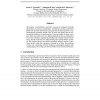Free Online Productivity Tools
i2Speak
i2Symbol
i2OCR
iTex2Img
iWeb2Print
iWeb2Shot
i2Type
iPdf2Split
iPdf2Merge
i2Bopomofo
i2Arabic
i2Style
i2Image
i2PDF
iLatex2Rtf
Sci2ools
NIPS
2004
2004
Similarity and Discrimination in Classical Conditioning: A Latent Variable Account
We propose a probabilistic, generative account of configural learning phenomena in classical conditioning. Configural learning experiments probe how animals discriminate and generalize between patterns of simultaneously presented stimuli (such as tones and lights) that are differentially predictive of reinforcement. Previous models of these issues have been successful more on a phenomenological than an explanatory level: they reproduce experimental findings but, lacking formal foundations, provide scant basis for understanding why animals behave as they do. We present a theory that clarifies seemingly arbitrary aspects of previous models while also capturing a broader set of data. Key patterns of data, e.g. concerning animals' readiness to distinguish patterns with varying degrees of overlap, are shown to follow from statistical inference.
| Added | 31 Oct 2010 |
| Updated | 31 Oct 2010 |
| Type | Conference |
| Year | 2004 |
| Where | NIPS |
| Authors | Aaron C. Courville, Nathaniel D. Daw, David S. Touretzky |
Comments (0)

